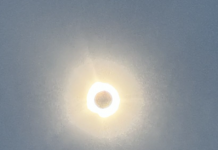
Kelly Barnhill reads The Girl Who Drank the Moon to a group of children
photo by ackerman+Gruber
Minneapolis native Kelly Barnhill is a mother of three and author of four novels for young readers. Her books have bewitched legions of fans by transforming the elements of classic fairy tales into heart-pounding adventures full of benevolent dragons, dark-hearted magicians, unlikely heroes, and dangerous journeys. The Girl Who Drank the Moon won this year’s Newbery Medal, the country’s highest honor in children’s literature.
“Winning was bananas! The committee called me at five in the morning. The possibility was just not on my radar—high fantasy novels just don’t win this award. This is a book that I thought would fail. I turned in the manuscript with a letter of apology to my editor. It’s overtly feminist and overtly feminine. It’s overtly political, and it’s political in a way that became more relevant than I meant.”
“After my older daughter, Ella, turned 1, I taught middle school English in the Minneapolis Public Schools for two years. Later, I wrote nonfiction books like Sewers and the Rats Who Love Them for elementary grades. If I go into a school and they have my book, The Wee Book of Pee, I’m a rock star with the third-grade boys.”
“My third book, The Witch’s Boy, started as a story I began telling my son while hiking in Shenandoah National Park. Hiking back from this beautiful waterfall—uphill the whole way—Leo wanted me to carry him, and so I told him a story instead. Leo used to say, ‘I want you to read me a story from your imagination,’ and I would ask for three things to include. This time, he wanted a boy who steals his mother’s magic. The boy has to protect it from bandits. ‘We need a third thing,’ I told him, and Leo said, ‘He has a friend who’s a wolf.’”
“So much of writing fiction is the process of wondering and asking questions. I make a box for each book—I like things I can touch—and everything—notes, maps, drawings—just gets shoved in there. I made a sketch of the tower from The Girl Who Drank the Moon, but it’s terrible! Once, a manuscript actually burst into flame on my old Dell laptop, and so I wrote it again. Since then, I write first drafts in longhand, put them away, and start over. The act of re-creation is important. You burn the fields and then everything is really fertile.”
“When the kids were little, I used to write from four to six in the morning. Motherhood is really good training for efficiency. You don’t realize how wickedly efficient you actually are. I was on book tour out East, and I had just done two events near Allentown, Pennsylvania. It was morning, and I had this big drive ahead of me. I got in the car, and I didn’t realize it was earlier than I thought it was. I looked at the clock and thought, ‘It’s nine o’clock, and I have already written 1,500 words. And I exercised, and I showered, and I packed, and I called my mom. All those things happened!’”
“My husband, Ted, and I used to read middle-grade novels out loud in the evening. When Ella was a baby, the first few Harry Potters came out, and we read them to each other while she snuggled between us. We read The Lord of the Rings, C.S. Lewis, Terry Pratchett…”
“We have this devaluing of literacy and books in the lives of children. If kids are reading less, it means the adults around them are reading less. Kids emulate what they see their parents doing.”
“When I gave the commencement speech at South High [in Minneapolis, Barnhill’s alma mater], I told the students that these four principles would carry them far: empathy, inventiveness, uncertainty, and curiosity. I said, ‘Life is uncertain. So you work with it, and make it work.’”








